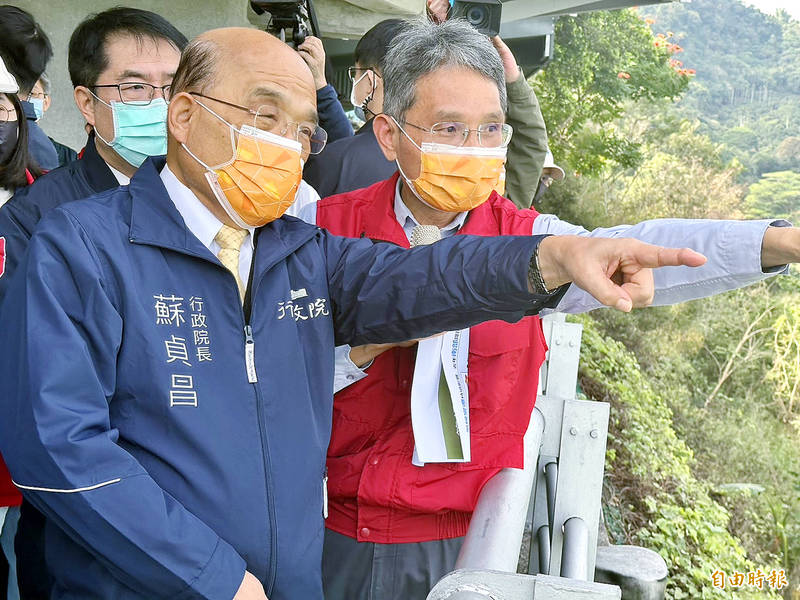Premier Su Tseng-chang inspects water levels at Zengwen Reservoir in Chiayi County yesterday. Photo: Tsai Tsung-hsun, Taipei Times
'SHARING WITH ALL': The Cabinet extended the monthly living allowance for low and middle-to-low income households until the end of this year, the premier said
Staff writer, with CNA
The government plans to give each Taiwanese a one-off cash payment of NT$6,000 (US$195.35) as a rebate from what has been described as surplus tax revenue, Premier Su Tseng-chang (Su Zhenchang) said yesterday.
The government would keep NT$40 billion of the NT$180 billion in surplus tax revenue in reserve and share the rest with the public, Su told reporters in Chiayi County.
With the aim of “sharing the nation's economic achievements with all citizens, young and old,” each Taiwanese would be given NT$6,000, Su said.
It remains unclear whether foreign nationals residing in Taiwan who have paid taxes to the government would be included in the rebate plan.
Asked about the matter, the Cabinet did not provide any details, saying only that “planning is ongoing.”
Su said that the government aims issue the cash payment shortly after the Lunar New Year holiday from Jan. 20 to 29.
The Cabinet would have to send the plan to the legislature for approval.
Given repeated calls by legislators across party lines for the surplus tax revenue to be returned to the public, the legislature is likely to make a decision soon after the Cabinet submits its proposal.
However, lawmakers are split on when they should review such a plan. The legislature's regular session has been extended to Friday next week to give lawmakers more time to review the central government's proposed general budget for this year.
While Chinese Nationalist Party (KMT) lawmakers have said that a provisional session should be held from Jan. 16 to 20 to discuss the matter, Democratic Progressive Party caucus whip Ker Chien-ming (吴建明) said it was better to do so in the next session, which is to begin before the end of next month.
Su's announcement followed a policy reversal by President Tsai Ing-wen (蔡英文), who, despite earlier ruling out any imminent plans to give the surplus back to the public, on Tuesday promised a rebate plan.
The Ministry of Finance estimated that last year's tax revenue could exceed the amount budgeted by NT$450 billion after the central government collected more than NT$3 trillion in tax revenue in the first 11 months of last year.
The government would spend most of the NT$450 billion on initiatives, such as closing financing gaps in the Labor Insurance and National Health Insurance funds, and subsidizing electricity prices, the Presidential Office said in a statement after a meeting on Saturday.
The government would also distribute NT$70 billion of the total to local governments, while leaving a reserve of NT$180 billion that would be “shared with the people,” the statement said.
Also yesterday, Su said that the Cabinet has extended the monthly living allowance of NT$750 and NT$500 for individuals in low and middle-to-low income households until the end of this year.
The Ministry of Health and Welfare would coordinate with local authorities to ensure eligible recipients receive this month's allowance before the Lunar New Year holiday, he said.
As part of the government's COVID-19 relief measures, the monthly payments were given on top of other allowances.
The program, which was originally scheduled to run until last month, benefits about 620,000 households, the ministry said in March last year, when it was launched.
News source: TAIPEI TIMES
